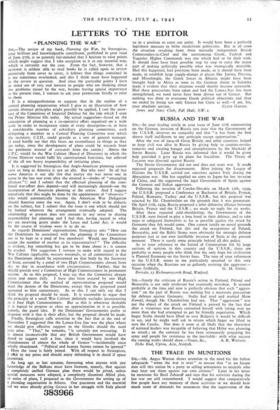RUSSIA AND THE WAR
SIR,—In your leading article in your issue of June 27th commenting on the German invasion of Russia you state that the Government of the U.S.S.R. deserves no sympathy and that " it has from the first shown itself indifferent to any principle except opportunism."
After the war of 1914-18 Great Britain and other countries helped to keep civil war alive in Russia by giving help to counter-revolu- tionaries and creating hunger and unemployment by the blockade of Soviet Russia. Later Russia was informed that it would be given help provided it gave up its plans for Socialism. The Treaty of Locarno was directed against Russia.
The Soviet Government did not and does not want war. It made repeated proposals for disarmament. After joining the League of Nations the U.S.S.R. carried out sanctions against Italy during the Abyssinian war. She has supplied no arms to Japan for her invasion of China, and she supported the legal Government of Spain against the German and Italian aggressors.
Following the invasion of Czecho-Slovakia on March isth, 1939, the U.S.S.R. proposed a Conference at Bucharest of Britain, France, Poland, Rumania, Turkey and the U.S.S.R., but this proposal was rejected by Mr. Chamberlain on the grounds that it was premature. On April 17th, 1939, Russia proposed a joint defensive alliance between Britain, France and the U.S.S.R. ; we made no reply for six weeks.
After these repeated cold-shoulderings the Government of the U.S.S.R. were forced to play a lone hand in their defence, and to take steps to safeguard themselves as far as possible against the attack by Germany they felt would come. One cannot justify on moral grounds the attack on Finland, but this and the occupations of Poland, Bessarabia, and the Baltic States were obviously for strategic defence purposes just as our own justifiable invasion of Syria at the present moment. There is surely some principle behind all this policy.
As to your reference to the hatred of Communism felt by large sections of opinion in this country and the U.S.S.R., there are probably as many people who think that the only hope for civilisation is Planned Economy on the Soviet lines. The tone of your references to the U.S.S.R. seems to me particularly unsuited to this very occasion when the Russians are so gallantly resisting the aggressor.—






























 Previous page
Previous page